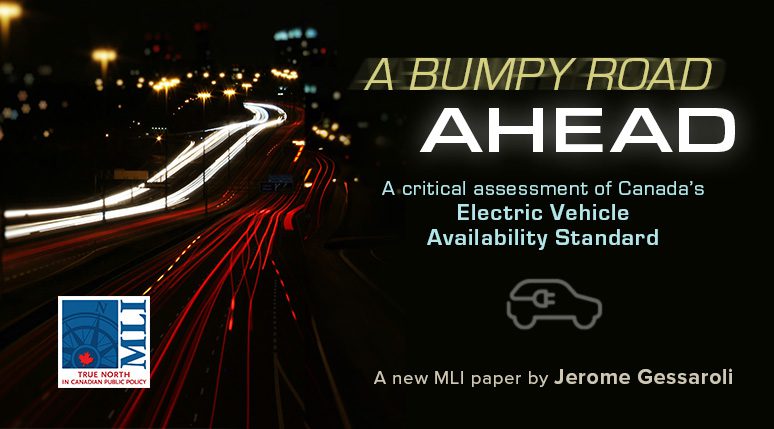OTTAWA, ON (May 9, 2024):
Recognizing the need to address the significant emissions of the transportation sector, the federal government has mandated that 100 percent of light-duty vehicle sales in Canada will be zero-emission vehicles by the year 2035. However, serious questions remain about whether this mandated timeframe is at all feasible or destined to be effective.
In a new paper, A bumpy road ahead: a critical assessment of Canada’s Electric Vehicle Availability Standard, Senior Fellow Jerome Gessaroli examines Canada’s ability to meet these mandates. Gessaroli assesses the suitability of electric vehicles for Canadians, comparative costs of EVs for consumers, the threat to the auto sector posed by government’s distortion of market realities, and even the potential geopolitical and national security ramifications of an EV mandate.
“While electric vehicles can lower GHG emissions, doubts persist whether they are fully substitutable for conventional, gas-powered vehicles,” notes Gessaroli.
“Concerns also exist about the threats the standard poses to Canada’s auto sector, its nascent EV supply chain, and critical mineral resource development. Building a charging infrastructure will require a large investment and substantial upgrades to the country’s electrical grids… Accelerating adoption timelines could worsen the above issues, uncertainties, and risks.”
Gessaroli writes that a more balanced and flexible approach to emissions reductions is in order – he recommends the government:
- Rescind the current mandated zero-emission vehicle sales minimums;
- Replace specific EV sales targets with increasingly stringent GHG emission standards for automakers;
- Ensure targeted emission standards and implementation timelines are realistic and align with industry efforts to source critical minerals and develop cheaper, yet profitable electric vehicles with superior operating characteristics.
“The government’s ambitious timeframe is unrealistic, risky, and potentially ineffective for achieving substantial GHG emission reductions,” concludes Gessaroli.
“Canada needs a more flexible approach to light-duty vehicle emissions reductions.”
To learn more, read the full paper here:
Jerome Gessaroli is Senior Fellow with the MacdonaldLaurier Institute and leads the Sound Economic Policy Project at the British Columbia Institute of Technology. He writes on economic and environmental matters, from a market-based principles perspective.
For further information, media are invited to contact:
Skander Belouizdad
Communications Officer
613-482-8327 x111
skander.belouizdad@macdonaldlaurier.ca







